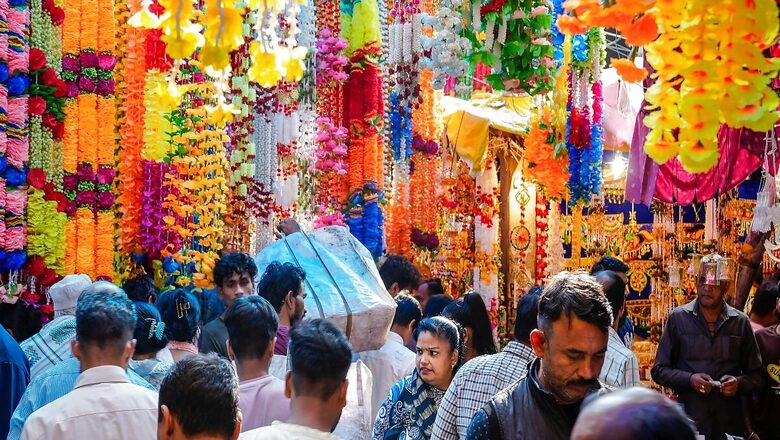
views
The national capital on Saturday got its cleanest Diwali eve air since 2015 due to consistent winds. The air quality further improved as the AQI at noon — standing at 228 — fell to 224 by 4 pm.
Delhi’s average AQI on the eve of Diwali stood at 220, in comparison to last year’s Diwali eve, where the AQI was at 259. All the regions of the city managed to stay out of the ‘very poor’ category of air quality, a Times of India report said.
The AQI was consistently in the ‘severe’ category from November 3 to 9, however, sudden and unseasonal rains came as a sigh of relief for the national capital. The skies covered in smog, became bluer and clearer after receiving rainfall on Thursday and Friday.
However, as per the early warning system, the air quality is likely to deteriorate again on Sunday in view of the Diwali celebrations. The warning system said, “The air quality is likely to reach the ‘severe’ category from November 13 to 14 and is likely to stay in the severe-very poor range for the next six days.”
The biomass burning contributed 10 per cent to the overall PM2.5 levels on Saturday, however, it is expected to go up to 29 per cent on Sunday, the IITM’s decisions support system said. Transport’s contribution to the overall PM2.5 stood at 14.7 per cent on Diwali eve.
India Meteorological Department scientist, Kuldeep Srivastava said that due to the impact of western disturbance, there were constant winds at 15-16 kmph on Saturday. However, he said that the wind speed would probably drop from Sunday afternoon from 15-16 kmph to 5-6 kmph.
According to Srivastava the minimum temperature will likely be 13-14 degrees Celsius and the maximum would be 28-29 degrees Celsius over the next 3-4 days. “There are chances of shallow fog on Sunday during the morning hours which will become moderate from Monday,” the IMD scientist added.
Meanwhile, amid the rising concerns of deteriorating air quality, the Delhi government on Saturday issued an advisory urging people to refrain from going on morning walks and exercising in the open in view of the health emergency. The advisory also noted that pregnant women, patients with underlying medical conditions, and elderly citizens should tread with caution and avoid exposure to the polluted air.
The Delhi health department also said that people must “avoid places with high air pollution like slow and heavy traffic roads, areas near polluting industries, construction/demolition sites, etc.”
Specifically on days with ‘severe’ AQI, the advisory asked the people to avoid outdoor physical exercises, walks, jogging and running.
The advisory further asked people to avoid smoking tobacco, burning mosquito coils and incense sticks in closed premises. It further asked them to stop burning wood, crop residues, waste and leaves.
Asking people to take good care of their, the government also advised people to consume a healthy diet, wash their eyes regularly and gargle on a daily basis with lukewarm water.
Meanwhile, Punjab on Diwali eve, reported 104 farm fires, taking the total number of stubble-burning incidents to 23,730 while air quality indices in Haryana and the border state were in ‘satisfactory’ and ‘moderate’ categories.
Of the 105 stubble burning incidents reported on Saturday, crop residue burning was seen in only 10 districts of Punjab.
Despite this, there was an improvement in air quality in Haryana and Punjab as both states have been seeing AQI in ‘very poor’ and ‘severe’ categories. Union Territory Chandigarh, the joint capital of Punjab and Haryana, saw an AQI of 110.
(With PTI Inputs)















Comments
0 comment